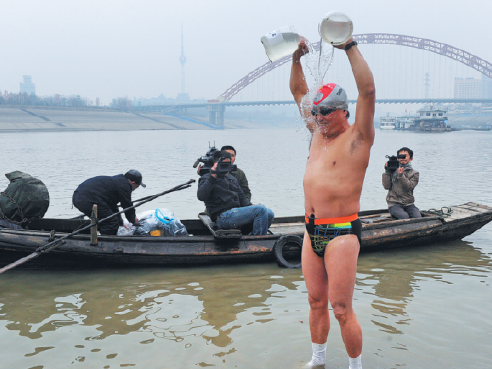Retiree's solo swim highlights river woes


Former telecom worker reports pollution findings after 2 months along Yangtze's longest tributary
Bao Zhengbin, 65, has just sent a 20-page report on the ecological state of the Yangtze River's longest tributary to the governors of two provinces.
The retiree has had a lifelong connection with the Hanjiang River, which runs about 1,500 kilometers eastward from Shaanxi province to Hubei province, and got a close-up view of its present state during a 60-day swim along the length of the river in August and September.
Bao passed through 25 counties and cities during his swim down the river.
He set out from one of its sources, in Shaanxi's Ningqiang county, on Aug 30, and swam from 10 am to 1 pm every day while the water was warm. As it got cooler, he rested when he got tired.
No one accompanied him during his swim, so he kept his food, drink and clothes in a waterproof bag.
After each day's swim, he would walk along the river, taking photographs of its ecological situation. He stayed in hotels at night, recording his daily observations in a diary that provided the basis for his report.
He found some places enjoyed good ecology status, with wetlands restored, chemical industries removed, and beautiful riverside beaches in Ankang and Baihe county, Shaanxi, and Qianjiang in Hubei.
But he also found environmental problems and suggested the banning of harmful activities such as throwing trash in the river, the production of detergent, shipping in areas that are sources of drinking water, and the excessive building of dams and bridges.
Born in Wuhan, the capital of Hubei, where the Hanjiang meets the Yangtze, Bao said he was nurtured by its waters and wanted to gain a complete picture of its present state and find out which parts need protection.
"It was said that the river gave its name to Han Chinese and the Western Han Dynasty (206 BC-AD 24) because founding emperor Liu Bang strengthened his army and gained his first success along the river," Bao said.
"When I swam in it, I deeply felt that the river will run forever, while men just live a generation. I adore it and appreciate it. Any behavior that pollutes it is unforgivable."
He said the environment issue is complicated, as the people who suffer from the pollutants are often the ones who produce them.
"Take laundry as an example. For thousands of years, the Chinese washed their clothes in the river and, as I saw, Shaanxi people still do this. It did not cause pollution before the industrial era, but today the phosphorus in detergents flows into the river. It made my hair stand on end just thinking about people drinking the water."
Bao said in the hope of jolting governments into tackling river pollutants, he made four copies of his diary. One has been sent to the conservancy commission that oversees the Hanjiang River, two have been sent to the governors of Shaanxi and Hubei, and one has been sent to a shipping museum in Shaanxi's Xunyang county.
The journey down the Hanjiang was not Bao's first long-distance swim. In 2011, while still working for China Telecom in Wuhan, he spent a month swimming the Yangtze, from Wuhan to Shanghai, accompanied by a support boat. Before that, he had been a keen winter swimmer for 20 years, which gave him the strength to finish the journey.
After a month's rest, he now plans a swim from Dongxing in the Guangxi Zhuang autonomous region to Danang in Vietnam.
"During the Hanjiang River journey, I encountered a family of three from Cuba in the shipping museum in Xunyang," he said. "They expressed admiration for my green tour and said I would be welcome to swim in the Caribbean Sea. I feel that when it comes to water, people from different nations seem much closer because, to some extent, all the waterways are connected.
"I want to continue learning about water ecosystem conditions across the world. There must be a lot of things to discover and record about how other countries protect their water ecology.
"I want to spend my retirement achieving my dream of swimming the world."





































